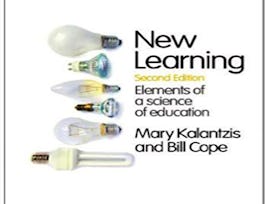What role does education play in achieving sustainable development goals? How can education drive transformative changes leading to environmentally and socially just societies? How can key stakeholders be involved in creating inclusive, equitable, and empowering learning environments that prepare individuals and communities for a rapidly changing world?



Expérience recommandée
Ce que vous apprendrez
Understand India's education policy trajectory
Problematise the role of education in sustaining social inequalities
Deliberate on how education can be transformed to attain equitable, just, and sustainable futures
Compétences que vous acquerrez
- Catégorie : Critical Pedagogy
- Catégorie : Teacher Development
- Catégorie : Diversity Equity And Inclusion Initiatives
- Catégorie : Education Policy
- Catégorie : Critical Thinking
Détails à connaître

Ajouter à votre profil LinkedIn
juillet 2024
6 devoirs
Découvrez comment les employés des entreprises prestigieuses maîtrisent des compétences recherchées


Obtenez un certificat professionnel
Ajoutez cette qualification à votre profil LinkedIn ou à votre CV
Partagez-le sur les réseaux sociaux et dans votre évaluation de performance

Il y a 7 modules dans ce cours
In this introductory module, you will learn a few important details about the course, including the objectives of this course, who the instructors and the course team are, as well as important information to navigate the course. You will also find a link to a Pre-Course Survey – please do fill this as it will help us get to know you better and prepare the course accordingly.
Inclus
1 vidéo3 lectures1 sujet de discussion1 plugin
In this module, you’ll become familiar with the development of the education system from Colonial India to Independent India and the continued impact of policy trajectories on school and teacher education. You will also have the opportunity to reflect on the potential role of teachers in achieving high-quality education.
Inclus
4 vidéos1 lecture1 devoir2 sujets de discussion
By the end of this module, you would develop some insight into how the concept of childhood evolved and how this understanding is critical to designing school curriculum and pedagogy. Engaging with the progression of the Right to Education Act would help in understanding how children’s rights are sought to be met in a plural and hierarchised society and how the role and accountability of the state is critical in safeguarding children's rights and their well-being.
Inclus
6 vidéos1 lecture1 devoir3 sujets de discussion
This module helps you recognise children as epistemic entities and the importance of encouraging children’s voice and agency in achieving their true potential. This module will assist you in cultivating capacities and dispositions to appreciate the diversity of children’s backgrounds and to integrate their lived experiences in the teaching-learning process.
Inclus
7 vidéos1 lecture1 devoir3 sujets de discussion
In this module, you will develop tools and capacities to understand, engage with and integrate diverse lived experiences of students in the teaching and learning process. You will be able to understand how formal schooling processes, communities, larger social and political contexts facilitate or hinder the inclusion of children in classrooms.You would also engage with ideas of decolonising school curriculum as part of a wider project of ‘decoloniality’ which implies dismantling relations of power and conceptions of knowledge that tend to reproduce hierarchies based on caste, gender, class, community, and region.
Inclus
8 vidéos1 lecture1 devoir3 sujets de discussion
This module of the course offers you opportunities to reflect upon the nuanced and deep influence that socio-cultural structures of class, caste, and community have on gender and how classroom pedagogy can be reinvented to equip teachers to become sensitive and socially responsive to the unequal nature of gender and to seek transformative pedagogies.
Inclus
6 vidéos1 lecture1 devoir3 sujets de discussion
In this final module, you will get the opportunity to check your understanding of all that you've learnt so far with the graded assessment in the form of a multiple-choice questionnaire. You will also hear from our instructors on what they hope the ideal key takeaways are for you from this course. Finally, please fill in the Post-course Survey – this will help us understand your journey during the course and improve it to make learning more meaningful.
Inclus
1 vidéo1 devoir1 plugin
Instructeurs


Offert par
Recommandé si vous êtes intéressé(e) par Education

University of Michigan

University of Illinois Urbana-Champaign

University of Michigan

University of Michigan
Pour quelles raisons les étudiants sur Coursera nous choisissent-ils pour leur carrière ?





Ouvrez de nouvelles portes avec Coursera Plus
Accès illimité à 10,000+ cours de niveau international, projets pratiques et programmes de certification prêts à l'emploi - tous inclus dans votre abonnement.
Faites progresser votre carrière avec un diplôme en ligne
Obtenez un diplôme auprès d’universités de renommée mondiale - 100 % en ligne
Rejoignez plus de 3 400 entreprises mondiales qui ont choisi Coursera pour les affaires
Améliorez les compétences de vos employés pour exceller dans l’économie numérique
Foire Aux Questions
Access to lectures and assignments depends on your type of enrollment. If you take a course in audit mode, you will be able to see most course materials for free. To access graded assignments and to earn a Certificate, you will need to purchase the Certificate experience, during or after your audit. If you don't see the audit option:
The course may not offer an audit option. You can try a Free Trial instead, or apply for Financial Aid.
The course may offer 'Full Course, No Certificate' instead. This option lets you see all course materials, submit required assessments, and get a final grade. This also means that you will not be able to purchase a Certificate experience.
When you purchase a Certificate you get access to all course materials, including graded assignments. Upon completing the course, your electronic Certificate will be added to your Accomplishments page - from there, you can print your Certificate or add it to your LinkedIn profile. If you only want to read and view the course content, you can audit the course for free.
You will be eligible for a full refund until two weeks after your payment date, or (for courses that have just launched) until two weeks after the first session of the course begins, whichever is later. You cannot receive a refund once you’ve earned a Course Certificate, even if you complete the course within the two-week refund period. See our full refund policy.


